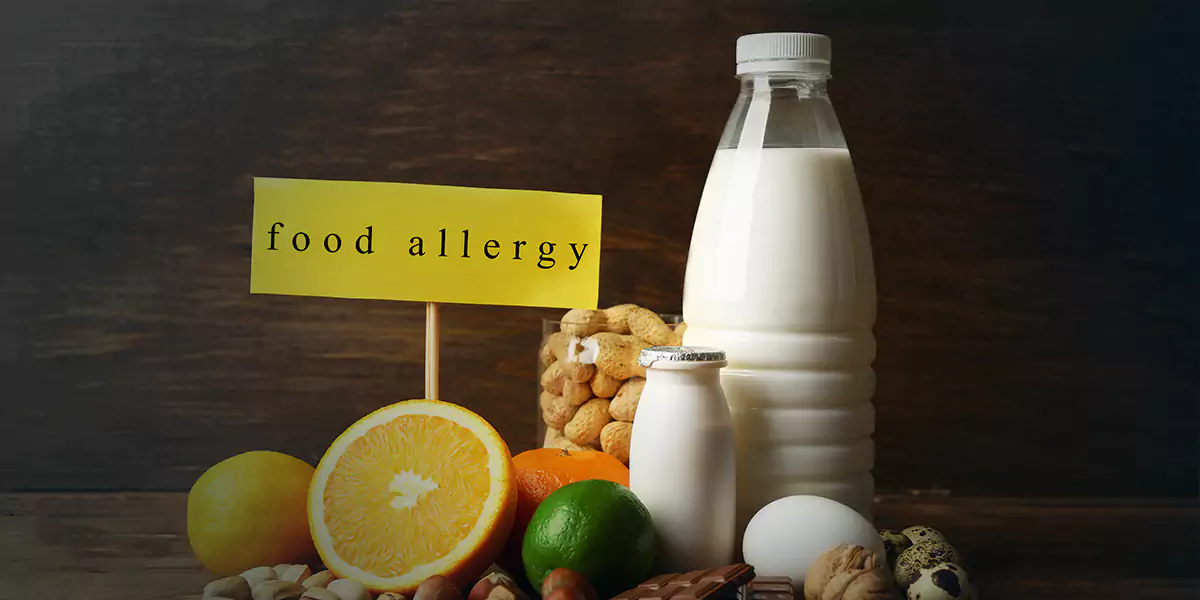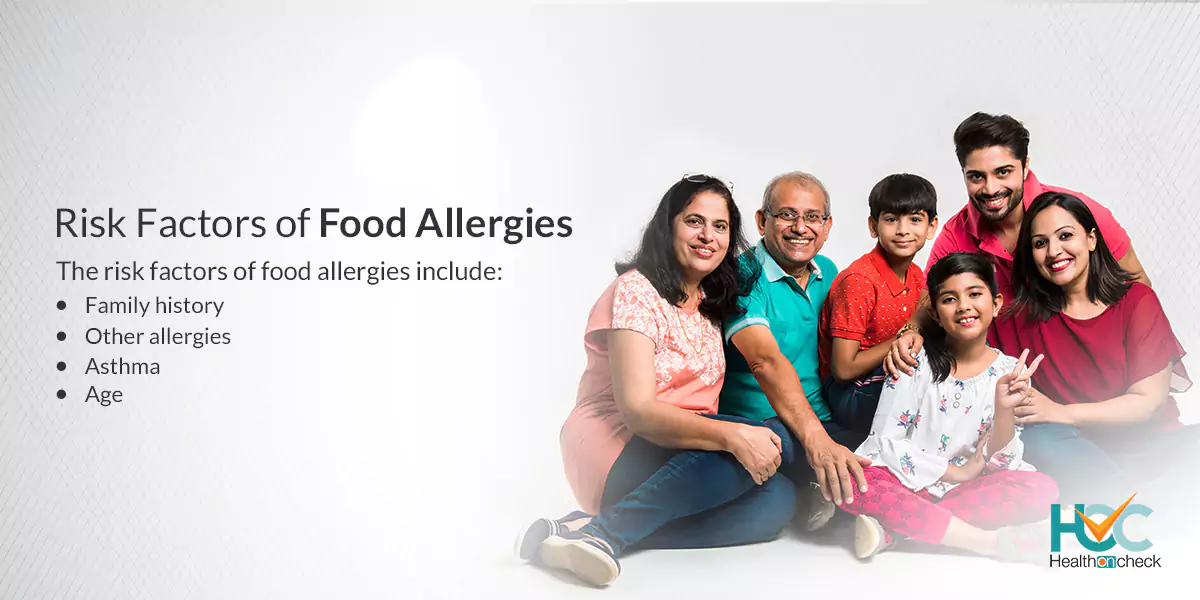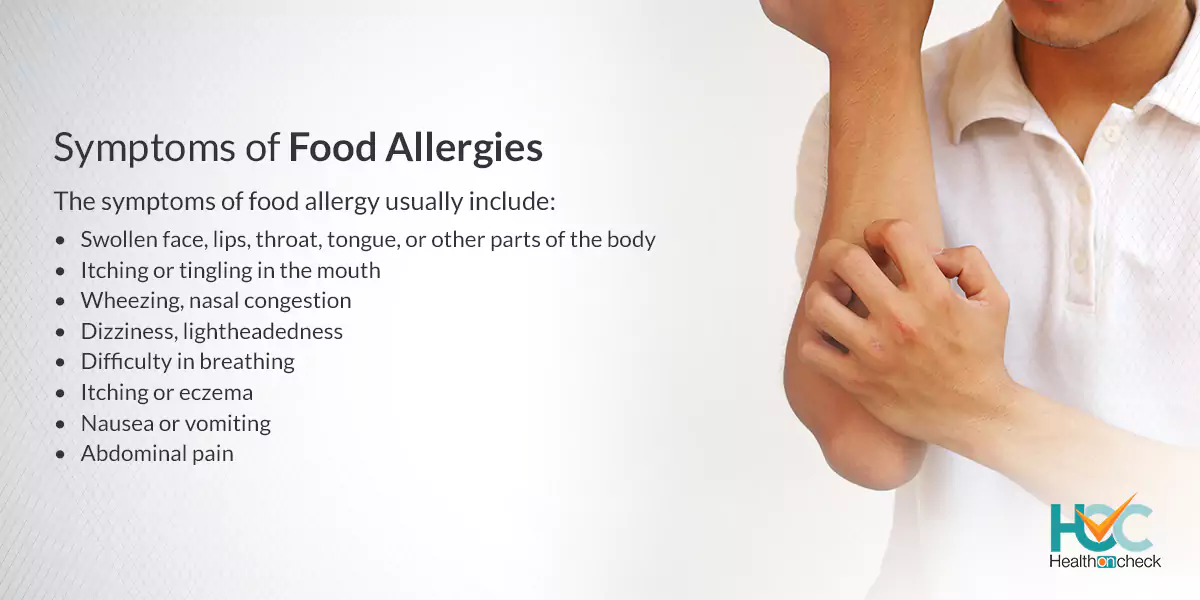What are Food Allergies?

Food allergies happen when your body has an immune response to some specific foods. Some of the most common food allergies include milk, peanut, and egg allergies. Avoiding triggering foods is the best way to prevent food allergies. In a few people, a food allergy can lead to serious symptoms or even a life-threatening reaction called anaphylaxis. If you experience severe allergic reaction symptoms, you should seek medical assistance immediately. Sometimes many confuse a food allergy with a much more common reaction called food intolerance. Food intolerance can be bothersome but it is a less serious problem that does not involve the immune system.
What are the Types of Food Allergies?
People can have allergies to any type of food but eight types of food account for nearly 90% of all food allergies. These foods include:
– Eggs.
– Fish.
– Milk.
– Peanuts.
– Shellfish.
– Soy.
– Tree nuts.
– Wheat.
What are the Symptoms of Food Allergies?
For a few people, an allergic reaction to a certain food might be uncomfortable but not a serious issue while for others, an allergic food reaction can be quite severe and even life-threatening. The symptoms of a food allergy generally start to appear within a few minutes to 2 hours after eating the specific food one is allergic to.
The symptoms of food allergy usually include:
– Itching or tingling in the mouth
– Hives
– Itching or eczema
– Swollen face, lips, throat, tongue, or other parts of the body
– Wheezing, nasal congestion
– Difficulty in breathing
– Abdominal pain
– Diarrhoea
– Nausea or vomiting
– Dizziness, lightheadedness
– Fainting
Anaphylaxis
In some parts of the population, a food allergy can trigger a serious allergic reaction known as anaphylaxis which can result in life-threatening signs and symptoms, including:
– Tightening and constriction of the airways
– Swollen throat
– Breathing problem
– Shock with a serious drop in blood pressure
– Fast pulse
– Dizziness, lightheadedness
– Loss of consciousness
Emergency treatment is needed if someone is suffering from anaphylaxis. If not treated anaphylaxis can lead to a coma or even death.
What are the Causes of Food Allergies?
During food allergy, your immune system identifies a certain food or a substance in food as something harmful by mistake. In response, your immune system prompts cells to produce an antibody called immunoglobulin E (IgE) to neutralise the allergy-causing food or substance in the food.
When you eat even a tiny amount of that food next time, IgE antibodies sense it and command your immune system to produce a chemical known as histamine, along with other chemicals, into your bloodstream. These chemicals cause symptoms of allergy.
The majority of food allergies are triggered by certain proteins in foods.
Food allergies also run in families. Some other allergic conditions like hay fever or eczema, can also trigger food allergy. If you have asthma then also you are more likely to experience food allergies.

What are the Risk Factors of Food Allergies?
The risk factors of food allergies include:
– Family history
If other conditions like asthma, eczema, hives, or allergies including hay fever are common in your family then you have an increased risk of developing food allergies.
– Other allergies
In case you’re already allergic to a certain food, then you might be at increased risk of becoming allergic to another.
– Age
Children, especially toddlers and infants have an increased risk of food allergies. As children grow older, their digestive systems develop and their bodies are less likely to develop allergies.
– Asthma
Asthma and food allergies usually happen together.
Factors that might increase your risk of getting an anaphylactic reaction include:
– Having asthma
– If you are a teenager or younger
– Late use of epinephrine for treating your symptoms of food allergy
– Having hives or other skin conditions
What are the Complications of Food Allergies?
The complications of food allergy might include:
– Anaphylaxis
A life-threatening allergic reaction.
– Atopic dermatitis (eczema)
Food allergy might result in a skin reaction, including eczema.
How Food Allergies Are Diagnosed?
There’s no specific test to confirm or rule out a food allergy. Your doctor will consider several factors before making a diagnosis including:
– The symptoms
Your doctor will check a detailed history of your symptoms including the foods, that seem to cause problems.
– Family history of allergies
Your doctor will ask you if you have a family history of allergies of any kind.
– A physical examination
A physical examination will be performed to identify or exclude other medical conditions.
Some more tests and procedures to diagnose food allergies include:
– A skin test
Your doctor is likely to perform a skin test that helps to find out your reaction to a specific food. During the test, a small amount of the suspected food is put on the skin of your forearm or back, and then your doctor will prick your skin with a needle to permit a small amount of the substance beneath your skin’s surface.
In case allergic to the specific substance that is tested, you will develop a raised bump or reaction. However, a positive reaction to this test alone isn’t enough to diagnose a food allergy.
– A blood test
A sample of your blood will be taken and sent to a lab where different foods can be tested to measure your immune system’s response to certain foods by measuring the allergy-related antibody called immunoglobulin E (IgE).
– Elimination diet
In this procedure, the suspected foods might be eliminated from your diet for a week or two and then add the food items back into your diet afterwards and it helps to connect symptoms to specific foods. However, the process is not foolproof to confirm a food allergy because it can’t tell whether your reaction to a food is actually a food allergy and not a food sensitivity.
– Oral food challenge
Here you will be made to eat small but increasing amounts of the food that might be causing your symptoms. If you don’t show any reaction during this test, you might be able to include this food in your diet again.
What are the Treatment Options Available for Food Allergies?
Avoiding the foods that cause signs and symptoms is the best way to prevent food allergies. However, regardless of your best efforts, you might come into contact with a food that causes your symptoms.
If you are aware of which foods are causing your allergies, you need to strictly remove those foods from your diet and always carry emergency medications including epinephrine autoinjectors which you can have in case of accidental ingestion and reaction. It’s quite vital to seek emergency medical care as soon as possible after using an epinephrine auto injector.
Your doctor might prescribe medicines that decrease your allergic reaction symptoms including:
– Epinephrine
It’s a lifesaving emergency medication that starts reversing symptoms of anaphylaxis immediately.
– Antihistamines
It reduces congestion or itching.
– Corticosteroids
These medicines are given to decrease swelling if you have a severe allergic reaction.
Living with Food Allergies
If you have a food allergy, it’s quite important that you carefully avoid all foods and ingredients that cause allergic reactions. With this precaution, you can live a healthy life with a food allergy. You might also be required to take nutritional supplements to replace any nutrients you lose because of avoiding the foods that trigger allergies in you. You should discuss this with your doctor or dietitian before beginning a new eating plan.
Whom to Consult?
If you have food allergy symptoms shortly after eating certain foods then you should immediately consult with your doctor and if possible, do it when the allergic reaction is occurring. This will help your doctor to make a diagnosis. Seek emergency treatment if you develop any signs or symptoms of anaphylaxis because this condition can be quite serious and sometimes even life-threatening.





